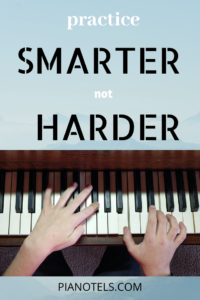You may be ready to take your piano to the next level and you want some ways to level up. Being an experienced piano player and a piano teacher for many, many years, I may have some advice for you or some things you may not have thought of before. See how you can improve your piano skills with these suggestions.
Practice Smarter, Not Necessarily Harder

Of course, the #1 factor in your piano skills is going to be how much you practice. The more you practice, the better you will be at it. The Law of the Harvest works here as it does in all areas of skills that you are working to improve. But just practicing more or harder will not necessarily make you better.
Your practice sessions should be consistent. Practicing three hours one day a week won’t go as far as practicing one hour for three days in a row. It’s the same principle as exercising. Working out really long and hard one day every once in a while won’t get you near as far as exercising a little bit each day will. Consistency over time pays off.
Practice intentionally. When you sit down to practice, do you have a plan or a goal? Or do you just go with whatever hits you at the moment and do whatever you feel like doing? You may end up doing the same thing every time you sit down, playing through the same song over and over and making the same mistakes. You never end up improving that way.
Just practicing the same thing over and over without working to improve it in one way or another, will make your practice time much less efficient.
So when you sit down, decide what your goals are. What order should you do first? Don’t just play through a piece over and over again and hope that that one particular passage will just magically get better. You need to evaluate where you are struggling and tackle that part with a vengeance. Take notes when you practice to remember where and what you want to improve. Perhaps its a particular passage, perhaps its timing, note learning, theory, or technique. Figure out your problem spots and fix them!
Just make your practices have a purpose and fulfill that purpose. You will become SO much more efficient in your practices with this overlooked trick of setting a goal for each practice and then doing it!
Record yourself. You may think that you play a passage a certain way, but you will often find yourself pretty surprised at what actually occurs. Record yourself — visually or audibly. Just turn your phone camera around and do a quick video of your song. You may discover that you hesitate or struggle in certain areas you hadn’t noticed before. You may notice that you don’t have as many dynamics or movement to the songs as you thought you had. Take note and go do it! Then record yourself again and see how you improved!
As a side not to recording yourself…its quite a rewarding experience to look back on old videos. You may not notice your improvement since it is usually gradual. But old recordings can sure show you just how much you have improved when you didn’t even know it!
Learn Something New
I am probably not the first one to discover that you have to push yourself beyond your current boundary if ever you are going to get better at anything. Wherever your comfort zone is now, you have to push beyond that to get better.
So where do you need to improve? Where are you a little too comfortable?
Perhaps you need to challenge yourself with some new music. I have some favorite books that I like to play through, and its probably time I need to find something more. But when I first found those books, I loved challenging myself with the new music and taking on new songs, new timing, and a new composer’s perspective.
Learn new theory. You can start with my list of what I believe all students should know. If there is anything on that list you don’t quite get, go find out more about it!
Take a free class. Several years ago I took a Fundamentals of Music Theory free course offered on Coursera. the first several lessons were really easy and I breezed through them. But then it started getting to the place where I began taking notes. I hadn’t realized the holes I had in my understanding. It really helped me to understand where music comes from. I totally recommend it! There are other courses on Coursera, some about music theory, others about music composition, history, jazz, and others! When I did a search on Coursera it came up with 236 hits.
Hang Out with the Pros

There’s nothing to help you improve in your music like hanging out, or networking, with others who are into piano as well. They have some valuable tips and experience that they can share with you. They also have connections and things that they can involve you in to help you.
Join a community of piano players and learn what they are playing, what ideas they are throwing around, and where they are going to get better. Having that support is priceless.
Another way to hang with the pros is to attend musical concerts, go hang out and watch a live band, or simply just listen to classical music. Much of piano is concerned with ear training. So although it seems passive, putting yourself in places where you can hear music (not just pop music) can help you gain that musical ear.
If you do attend a concert, listen to the piano and listen to its patterns, its movement, its involvement in the song to create the music. There is much to be learned through watching and listening intently!
Perform
There is nothing like a recital that gets you to improve your skills! Not only do you want to achieve perfection, you have a deadline to do so. There’s nothing better than an upcoming performance to really put the heat on and get you to practice and become as perfect as you can.
Look for opportunities to play at:
- a local coffee shop
- at your church to accompany a choir, or a congregation
- put on your own performance for friends and family
- I don’t doubt the local nursing home would love for you to come play for them! Check out my article on A Guide to a Musical Performance in a Nursing Home or Assisted Living.
The more opportunities you have to perform, the faster you will improve and the better the pianist you will become.
Warm-Up
Your piano warm-ups may not be what they should. Perhaps you need to work on ways you can warm up. Here are a few:
- Sight reading: learn through application
- Mental play
- Hanon, or other exercises for technique
- Scales
- Arpeggios
- Transposing
- Flashcards
- Simply warming your hands up
I have a full article on how best to utilize your warm up to your best advantage. Check out 8 Piano Warm-Ups for Pianists.
Memorize a Song
You may not realize it, but just the fact of memorizing your music can help you drastically in your piano skills. You may think you have a song down well, but you never quite know what you don’t know until you have it memorized.
Memorizing a song causes you to look at every note and make sure you got it down. It makes you look in the details and not just skim over.
As you memorize the song, record it and then follow along in your music as you listen to it again. You may find some things you hadn’t realized you were missing before. Make sure when you are memorizing that you are doing it right. A memorized mistake is not easy to remedy! So do it right the first time.
Related Articles:
How Much Time Do Pianists Practice Every Day?

Tel loves her life as a piano player, a piano teacher, and a mom. Amid piano blogging, piano teaching, and piano playing, she loves a chance to fit in a good exercise class, volunteer at her kids’ school and at her church, and go on long dates with her husband. Full bio at About Tel.


